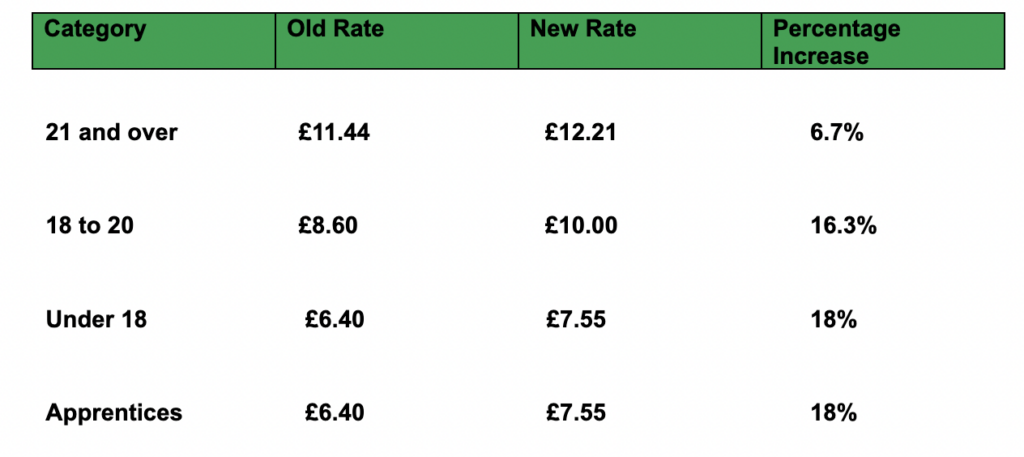National Minimum Wage Increase – What Employers Need to Know
The new National Minimum Wage (“NMW”) will take effect from 1st April 2025. The rates have significantly increased compared to previous years. Five years ago, the rate for someone aged 25 and over (now reduced to 21 and over) was £8.72. This increase is likely to have a substantial impact on employers, especially those which have more reliance on younger workers such as the retail and hospitality industries.
The new rates are as follows: –

Obligations on businesses
Businesses are legally obliged to pay the NMW. This applies to all staff whether they are full or part-time, permanent or temporary, zero-hour or agency workers.
Businesses are legally required to keep records to prove that NMW has been paid, which are disclosable to workers and HMRC enforcement officers. These records should be maintained for at least 6 years and include evidence of the hours the worker worked, and the payments made to them (for example, pay slips).
Consequences of a failure to pay NMW
There can be significant consequences of a failure to pay NMW.
- Reputational Damage – HMRC have the power to ‘name and shame’ and more importantly HMRC do name and shame.
- Penalties – Up to 200% of the underpayment can be levied as a penalty, capped at £20,000 per worker.
- Legal Action – Workers can pursue claims to the Employment Tribunal to recover the underpayments. Employment Tribunals are free for employees and workers to enforce their rights.
- Criminal Sanctions – there are also criminal offences related to failing to keep records, keeping or providing false records, intentionally obstructing or delaying an enforcement officer, and refusing or neglecting to answer questions or provide information to an enforcement officer.
Our Tips
Don’t be caught out. Have systems in place to keep track of employees and changes to NMW to avoid falling foul of the NMW obligations and ensure that you update payroll systems (internal and external).
Know your workers and understand the NMW requirements and obligations for all your workers and calculate their hourly rate correctly. Consider the following: –
- check worker’s age (the new rate begins when they fall into the next category).
- Increase the hourly rate if the employee is no longer an apprentice and is 18 or above.
- Do you have employees who have paid/tied accommodation?
- Do you pay employees for their breaks?
- Are your employees sleep-in workers?
- Do you deduct for uniform?
- Do you offer ‘salary sacrifice’ arrangements?
- Do you pay overtime with shift premiums?
- Are workers expected to perform extra unpaid hours such as being on the shop floor before their shift commences?
This list is not exhaustive and other work arrangements can result in employers making mistakes with NMW.
If you are an employer or an employee and need advice as to how these changes will affect you please use our online contact form and we can explain how we can help you.


